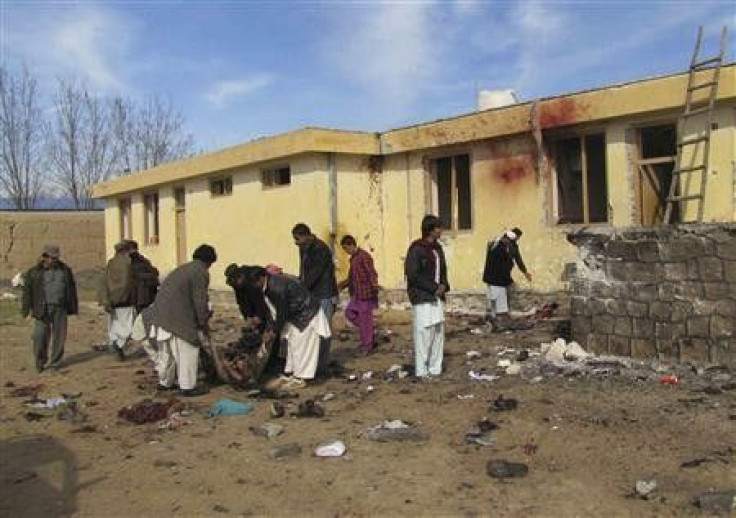Suicide bomber kills 30 as Afghan violence spreads

A suicide bomber killed at least 30 people in a government office in northern Afghanistan on Monday, officials said, with violence spiralling across the country even before an expected spring offensive.
Afghan and NATO-led forces were also investigating two serious incidents involving civilian casualties, the latest killing up to six people when a misdirected air strike appeared to hit a home in eastern Nangarhar province.
In Kunduz province in the north, the centre of a growing front in the Taliban-led insurgency, a suicide bomber killed at least 30 people, Mohammad Ayoub Haqyar, the chief of Emam Saheb district, told Reuters. Another 40 were wounded.
Haqyar said the bomber struck while people were queueing to collect identity cards inside a government office. Kunduz police chief, Abdul Qayum Ibrahimi, said three police were among the dead and that many civilians were wounded.
Taliban spokesman Zabihullah Mujahid, speaking by telephone from an undisclosed location, claimed responsibility for the Kunduz blast on behalf of the Islamist group. He said the target was men who were signing up for a community police group.
Kunduz has become established as an insurgent base over the past two years, with attacks radiating out into surrounding provinces while NATO-led International Security Assistance Force (ISAF) offensives have been concentrated in Taliban strongholds in the south and east.
In 2010, violence across Afghanistan hit its worst levels since the Taliban were ousted by U.S.-backed Afghan forces in late 2001, despite the presence of about 150,000 foreign troops.
So far in 2011 there has been no let-up in attacks, or any sign of the traditional winter lull, and U.S. commanders have warned violence is likely to spike even more when spring begins.
That is a worrying sign, analysts say, with U.S. President Barack Obama having pledged to begin a gradual withdrawal of U.S. troops in July as part of an overall timetable to hand security responsibility to Afghan Forces in 2014.
U.S. commanders say their troops have started to make real headway, mainly in the south, since 30,000 extra troops arrived last year. But some analysts now question the wisdom of the July timetable so soon after progress has been noted and argue foreign troops should stay beyond 2014 to consolidate gains.
MORE CIVILIANS KILLED
Afghan civilians continue to bear the brunt of the war, and those caused by foreign troops have long been a source of tension with Afghan leaders.
ISAF said it was investigating whether its forces had killed or wounded civilians in a strike against insurgents seen placing a roadside bomb in eastern Nangarhar province on Sunday.
Reuters Television footage from the area showed two dead children, a boy and a girl, placed in fleece-lined coffins. A Reuters witness reported seeing six bodies outside a house in Nangarhar's Khogiani district, including four children.
Ahmadzia Abdulzai, a spokesman for the Nangarhar governor, said a missile had killed six family members.
A badly damaged house could be seen with a gaping hole in its roof, which appeared to have been hit by a rocket or a missile fired from an aircraft.
This is a deeply regrettable accident, ISAF spokesman U.S. Army Colonel Patrick Hynes said in a statement.
Late on Sunday, Afghan President Hamid Karzai strongly condemned raids in Kunar province, also in the east, which his office said killed more than 50 civilians.
Kunar Governor Fazlullah Wahidi earlier told Reuters that 64 civilians were killed by ground and air strikes in the Ghazi Abad district during operations spanning four days.
ISAF however cast doubt on the toll in Kunar but said an investigation with Afghan officials had begun on Monday.
Rear Admiral Greg Smith, the chief ISAF spokesman, said the probe would centre on a firefight that began in a rugged and remote area on Thursday night and lasted more than five hours.
He said ISAF had clear intelligence that Taliban leaders were planning a meeting that evening and that surveillance footage from weapons systems did not indicate any civilians, or permanent settlements, were in the area.
Rules governing air strikes and night raids have been tightened significantly in the past two years, leading to a drop in civilian casualties caused by foreign forces.
A United Nations report late last year found that civilian casualties in Afghanistan rose 20 percent in the first 10 months of 2010 compared with 2009, with more than three-quarters killed or wounded by insurgents.
On Saturday, at least 40 people were killed in an attack on a bank in Jalalabad, the capital of Nangarhar, the worst attack in Afghanistan for eight months.
© Copyright Thomson Reuters 2024. All rights reserved.











